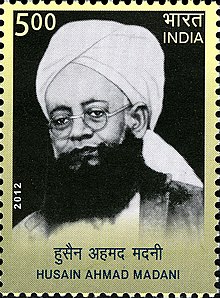ഹുസൈൻ അഹ്മദ് മദനി
ഇന്ത്യയിലെ ഒരു ഇസ്ലാമിക പണ്ഡിതനും രാഷ്ട്രീയപ്രവർത്തകനുമായിരുന്നു ഹുസൈൻ അഹമ്മദ് മദനി (6 ഒക്ടോബർ 1879 - 5 ഡിസംബർ 1957).
Shaykh al-Islam, Mawlana ഹുസൈൻ അഹ്മദ് മദനി | |
|---|---|
 | |
| ദാറുൽ ഉലൂം ദയൂബന്ദിന്റെ അഞ്ചാമത്തെ പ്രിൻസിപ്പൽ | |
| ഓഫീസിൽ 1927 – 5 December 1957 | |
| മുൻഗാമി | അൻവർഷാ കശ്മീരി |
| പിൻഗാമി |
|
| ജംഇയ്യത്തുൽ ഉലമയെ ഹിന്ദിന്റെ നാലാമത്തെ അധ്യക്ഷൻ | |
| ഓഫീസിൽ 1940 – 5 December 1957 | |
| മുൻഗാമി | കിഫായതുല്ലാഹ് ദഹ്ലവി |
| പിൻഗാമി | അഹ്മദ് സഈദ് ദഹ്ലവി[1] |
ദാറുൽ ഉലൂം ദയൂബന്ദിന്റെ പ്രിൻസിപ്പൽ ആയി പ്രവർത്തിച്ച അദ്ദേഹത്തിന് 1954-ൽ പ്രഥമ പത്മഭൂഷൺ പുരസ്കാരം ലഭിച്ചിരുന്നു[2][3].
1920-കളിൽ കോൺഗ്രസ്-ഖിലാഫത്ത് ഉടമ്പടി രൂപീകരിക്കുന്നതിൽ മദനി സുപ്രധാന പങ്ക് വഹിച്ചു. ഇന്ത്യൻ നാഷണൽ കോൺഗ്രസ്സുമായി ഇന്ത്യൻ മുസ്ലിം പണ്ഡിതരുടെ സഹകരണം നിലനിർത്താൻ അദ്ദേഹത്തിന്റെ പ്രഭാഷണങ്ങളും ലഘുലേഖകളും സഹായകമായിത്തീർന്നു[4]. അദ്ദേഹത്തിന്റെ മുത്താഹിദ ഖൗമിയത്ത് ഔർ ഇസ്ലാം എന്ന കൃതി ഇന്ത്യയുടെ വിഭജനത്തെ എതിർക്കുന്നതായിരുന്നു. ഒരൊറ്റ രാജ്യമായി ഇന്ത്യ നിലകൊള്ളണമെന്ന് ആ കൃതിയിൽ അദ്ദേഹം വാദിക്കുന്നുണ്ട്[5].
ജീവിതരേഖ
തിരുത്തുകഉത്തർപ്രദേശിലെ ഉന്നാവോ ജില്ലയിലെ ബംഗർമൗ എന്ന പ്രദേശത്തായിരുന്നു ഹുസൈൻ അഹ്മദ് ജനിച്ചത്. അതേ പ്രദേശത്ത് അധ്യാപകനായി പ്രവർത്തിച്ചിരുന്ന പിതാവ് സയ്യിദ് ഹബീബുല്ലയുടെ[6] കുടുംബം യഥാർത്ഥത്തിൽ ഫൈസാബാദ് ജില്ലയിലെ ടൻഡ സ്വദേശികളായിരുന്നു.
രചനകൾ
തിരുത്തുക- Composite Nationalism and Islam
- Naqsh-e-Hayat (Autobiography of Maulana Madni).[7]
- Ash-Shihabus Saqib (A refutation of Ahmed Raza Khan Barelvi) [8]
- Maktubat Shaykh al-Islam (Spread over 2000 pages).[9]
- Safar Nama Shaykhul Hind Mahmud al-Hasan (related to Silk Letter Movement).[9]
- Tasawwur-e-Shaikh (related to Tasawwuf)[9]
അവലംബം
തിരുത്തുക- ↑ Salman Mansoorpuri (2014). Tehreek Azadi-e-Hind Mai Muslim Ulama aur Awaam ka Kirdar (in ഉറുദു). Deoband: Deeni Kitab Ghar. p. 194.
- ↑ "Padma Awards" (PDF). Ministry of Home Affairs, Government of India. 2015. Archived from the original (PDF) on 15 November 2014. Retrieved 19 July 2017.
- ↑ The rise and fall of the Deoband movement, The Nation (newspaper), Published 27 June 2015, Retrieved 19 July 2017
- ↑ Sikka, Sonia; Puri, Bindu; Beaman, Lori G. (2015). Living with Religious Diversity (in ഇംഗ്ലീഷ്). Routledge. ISBN 9781317370994.
- ↑ Peers, Douglas M.; Gooptu, Nandini (2017). India and the British Empire (in ഇംഗ്ലീഷ്). Oxford University Press. ISBN 9780192513526.
Madani, head for several decades of the Deoband training centre for theologians, strongly supported Congress nationalism and the ideal of a 'composite nationalism' within an united India, which he thought would be more conducive to the spread and prosperity of his community over the entire subcontinent than any religious partition.
- ↑ Muhammad Ruhul Amin Nagori, "ফেদায়ে মিল্লাত সায়্যিদ আসআদ মাদানী (র:)", জীবনী (in Bengali), As Siraz
- ↑ "Naqsh e Hayat by Shaykh Husain Ahmad Madni (R.a)".
- ↑ "Ash-Shihab-us-Saqib by Shaykh Husain Ahmad Madni (R.a)".
- ↑ 9.0 9.1 9.2 Ma'asr Shaykh al-Islam (Biography of Hussain Ahmed Madani), Mawlāna Nizāmuddīn Asīr Adrawī, Page 494, Darul Mu'allifeen Deoband (5th edition, April 2017).
ഗ്രന്ഥസൂചിക
തിരുത്തുക- Metcalf, Barbara (2012), Husain Ahmad Madani: The Jihad for Islam and India's Freedom, Oneworld Publications, ISBN 978-1-78074-210-6
- Moj, Muhammad (2015), The Deoband Madrassah Movement: Countercultural Trends and Tendencies, Anthem Press, ISBN 978-1-78308-389-3